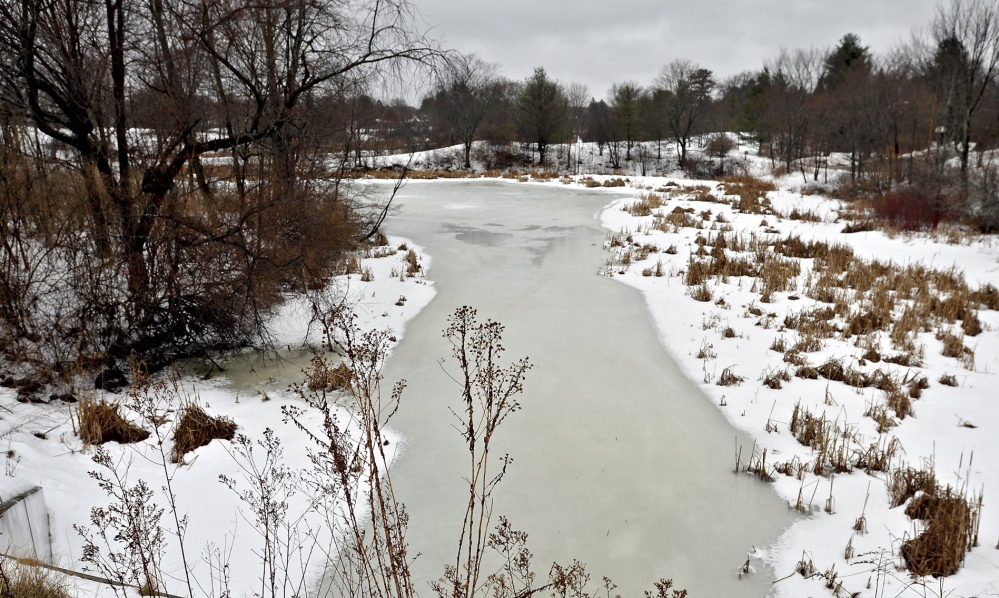City officials are seeking permission from the Portland Planning Board to excavate sediment and remove cattails from Capisic Pond, the largest body of freshwater in Portland and the focus of more than a decade of studies and restoration efforts.
The project, intended to improve the area’s recreational value and habitat for wading birds, may require the removal of turtles and could make the pond uninhabitable for birds that use the cattails as breeding grounds.
Derek Lovitch, a bird watcher, said he is concerned about the effects on turtles, migratory birds and their food, such as aquatic insects.
“All of those things are going to be impacted,” he said. “Whether they’re impacted negatively or positively remains to be seen.”
The project is planned to increase the amount, and depth, of open water on the pond, which is between Brighton Avenue and Capisic Street. It is intended to increase the aesthetic appeal and recreation opportunities of the pond, and maintain its designation as a wildlife habitat of moderate importance.
Funding for the $2.1 million project is being sought through the city’s 2015 Capital Improvement Program and potential grants. It could begin as soon as late fall.
According to the city’s application, Capisic Pond was created in the 1660s, when a dam was installed for a grist mill. It was last dredged in the early 1950s. Since then, the watershed has been used as a stormwater outfall, causing the edges of the pond to become filled with soot and dirt.
The pond once had nearly 8 acres of open water, but the rapid growth of cattails has reduced that to about 2 acres. Current depths range from 18 inches on the fringes to 36 inches in a few pockets.
Capisic Brook is listed as an urban-impaired stream. While the project would improve water quality, the city is under no state or federal mandate to dredge and excavate the pond, said Doug Roncarati, who coordinates the city’s stormwater program.
“The driving force is pretty much the community,” he said, noting that residents wanted better recreational opportunities.
Over the last 15 years, the city has made investments to clean up the 1,400-acre Capisic Brook watershed. Roncarati said “tens of millions of dollars” have been spent on about 25 projects, including reducing the number of stormwater and sewer outfalls from seven to one.
The excavation project is separate from $13 million in improvements suggested in the new Capisic Watershed Management Plan, Roncarati said.
The excavation, known as the Capisic Pond enhancement project, calls for the removal of 16,000 cubic yards of sediment. About 7,500 cubic yards would be reused on the site, while the rest would be disposed of at a yet-to-be-determined site.
The city estimates that will require 100 truckloads per day over a three- to four-week period, making traffic a concern for neighbors.
Once the project is complete, the pond would have 4.5 acres of open water, according to the city’s application. Excavation would increase the depth by 3 feet, to discourage cattail growth but allow diving ducks to fish in the deep areas and wading birds to hunt on the fringes.
Rancarati said the city is working with the Maine Department of Inland Fisheries and Wildlife and the Department of Environmental Protection to minimize the impact on wildlife, especially during migratory periods. Special attention will be paid to effects on the black-crowned night heron, which is listed as a threatened species by the state.
Lovitch said he isn’t taking a position on the project because Capisic Pond is man-made. However, he noted its importance as an “urban oasis” for migratory birds.
During the spring, the pond is a hot spot for people looking for warblers, while in the fall it’s popular for sparrow watchers, Lovitch said.
Throughout the summer, yellow warblers, American gold finches and cardinals are regulars, he said.
Lovitch said the cattail removal would reduce the presence of Sora birds and Virginia rails, which prefer marshy conditions.
“Anytime you disrupt the environment, there will be changes,” he said. “There will be positives for some birds, and negatives for others.”
Randy Billings can be contacted at 791-6346 or at:
rbillings@pressherald.com
Twitter: @randybillings
Send questions/comments to the editors.




Success. Please wait for the page to reload. If the page does not reload within 5 seconds, please refresh the page.
Enter your email and password to access comments.
Hi, to comment on stories you must . This profile is in addition to your subscription and website login.
Already have a commenting profile? .
Invalid username/password.
Please check your email to confirm and complete your registration.
Only subscribers are eligible to post comments. Please subscribe or login first for digital access. Here’s why.
Use the form below to reset your password. When you've submitted your account email, we will send an email with a reset code.